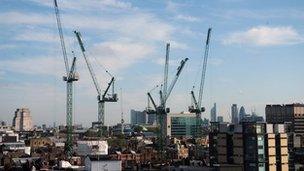Government ignored warning of blacklisting of workers
- Published

The Consulting Association kept secret files on thousands of workers for sixteen years
The last government failed to act on information from a whistleblower about blacklisting more than two years before it was exposed, the BBC has learnt.
In 2009, the Information Commissioner's Office raided a firm which checked potential recruits against a secret list for major construction firms.
However, a BBC investigation has found that a DTI official met an industry insider in 2007 about the practice.
The government said the DTI had continued to monitor the issue.
In March 2009, the Information Commissioner's Office (ICO) announced it was prosecuting a West Midlands-based company for committing a "serious breach" of the Data Protection Act.
The company, The Consulting Association, kept secret files on thousands of workers for 16 years, against which checks would be made by subscribing construction companies.
Secret files
Dozens of those whose details were kept have complained they were prevented from finding work because of their membership of trade unions or for raising health and safety concerns.
"In the last seven years, I've taken home 16 wage packets, the hardship's been terrible," said Steve Acheson, an electrician.
"And I know other families are suffering in the same way," he said.
The files recovered by the ICO in 2009 include references to trade union "troublemakers" and even private details about some workers' wives and girlfriends.
But a BBC investigation has discovered that the then Department of Trade and Industry knew of detailed allegations about the blacklisting more than two years before the ICO raid and failed to act on them.
In January 2007, a senior official from the DTI, Bernard Carter, met a former construction industry HR executive in a hotel in Chester.
In minutes of the meeting seen by Radio 4's The Report, the industry insider, Alan Wainwright, is described as having "direct experience of using lists to decide whether individual electricians should be employed".
It also details that Mr Wainwright met Ian Kerr, who was The Consulting Association's chief officer, as far back as 1997.
Whilst the minutes say that Mr Wainwright was not aware of the criteria The Consulting Association used to include names on its list, it says:
"From conversations with colleagues and with electricians he assumed that troublemakers of various kinds were included and those who had been involved in organising or leading industrial action were likely to be included."
Alan Wainwright declined to be interviewed by The Report.
No action
A spokesperson for the Department for Business, Innovation and Skills (BIS) confirmed to the BBC that no action was taken as a result of the meeting.
Sarah Veale, head of equality and employment rights at the TUC says she is surprised by the admission.
"It seems amazing the DTI has a formal note of this meeting that they never did anything with," she told The Report.
"This isn't evidence from those who've been blacklisted as one might expect, this is evidence from someone who was involved in processing the data."
At the time, the TUC had been urging the then Labour government to activate part of the Employment Relations Act 1999 outlawing blacklisting because of anecdotal evidence from trade unionists that the problem was increasing.
But Sarah Veale says they were told the regulations would not be enacted because of a lack of evidence.
"It's very disappointing to know that this was around at the same time that the TUC was lobbying hard to get the government to put the blacklisting regulations onto the statute book."
The regulations were eventually introduced in 2010 but only after The Consulting Association had ceased operating.
A BIS spokesperson said: "We can confirm that, as part of the then government commitment to take action if evidence emerged that blacklisting was taking place, a meeting was held between Bernard Carter and Mr Alan Wainwright in January 2007.
"Following that meeting a decision was taken that no immediate action was warranted; however the government continued to monitor the issue."
A parliamentary inquiry by the Scottish Affairs Committee into blacklisting in employment has been hearing evidence on the issue since last summer.
Labour and the union Unite have called for a full-scale Leveson-style inquiry into the matter, which they have described as a national scandal.
Listen to The Report on BBC Radio 4 on Thursday, 14 February at 20:00. You can listen again via the Radio 4 website or The Report download.
- Published23 January 2013
- Published5 February 2013
- Published6 August 2011